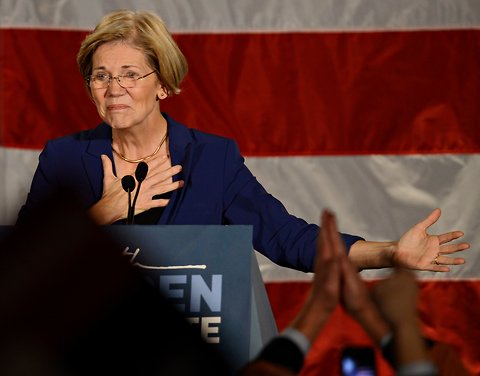 Gretchen Ertl/Reuters Elizabeth Warren greeting supporters in Boston after her Senate victory on Tuesday.
Gretchen Ertl/Reuters Elizabeth Warren greeting supporters in Boston after her Senate victory on Tuesday.
Simon Johnson is the Ronald A. Kurtz Professor of Entrepreneurship at the M.I.T. Sloan School of Management and co-author of “White House Burning: The Founding Fathers, Our National Debt, and Why It Matters to You.”
One of the most important results on Tuesday was the election of Elizabeth Warren as United States senator from Massachusetts. Her victory matters not only because it helps the Democrats keep control of the Senate but also because Ms. Warren has a track record of speaking truth to authority on financial issues – both to officials in Washington and to powerful people on Wall Street.
Today’s Economist
Perspectives from expert contributors.
During the campaign, Ms. Warren’s opponent and his allies made repeated attempts to portray her as antibusiness. In the most bizarre episode, Karl Rove’s Crossroads GPS ran an ad that contended that she favored bailing out large Wall Street banks. All of this was misdirection and disinformation.
Ms. Warren has long stood for transparency and accountability. She has insisted that consumers need protection relative to financial products – when the customer cannot understand what is really on offer, this encourages bad behavior by some companies. If this behavior spreads sufficiently, the entire market can become contaminated – damaging the entire macroeconomy, exactly as we have seen in the last decade.
Honest bankers should welcome transparency in all its forms. And the Consumer Financial Protection Bureau, which Ms. Warren helped to establish, has made major steps in this direction.
Ms. Warren has strong support from the progressive wing of the Democratic Party, and her resistance to sharp practices by big banks resonates across the political spectrum. (Disclosure: James Kwak and I wrote positively about Ms. Warren and her approach in “13 Bankers.”)
She has also established an impressive track record for effective oversight in Washington. As the chairwoman of the Congressional Oversight Panel for the Troubled Asset Relief Program, she drew bipartisan praise (until, of course, she decided to run for public office).
How much can a new senator accomplish? Within hours of her victory, some commentators from the financial sector suggested that no freshman senator could achieve much.
This is wishful thinking on their part. A newly elected senator can have a great deal of impact if she is well informed on relevant details, plugged into the policy community and focused on a few key issues. It also helps if such a senator can bring effective outside pressure to bear – and Ms. Warren is a most effective communicator, including on television. She has an unusual ability to cut through technical details and to explain the issues in a way that everyone can relate to.
Ms. Warren is a natural ally for Senators Sherrod Brown of Ohio, Jeff Merkley of Oregon, Carl Levin of Michigan, Jack Reed of Rhode Island and other sensible voices on financial sector issues (including some on the Republican side who have begun to speak out). My expectation is that Ms. Warren will work effectively across the aisle on financial sector issues without compromising her principles – and this could really be productive in the Senate context.
Hopefully, Ms. Warren will get a seat on the Senate Banking Committee, where at least one Democratic slot is open.
President Obama should now listen to her advice. Senator Warren should have been appointed head of the Consumer Financial Protection Bureau in 2010 – but was opposed by Treasury Secretary Timothy Geithner. Unfortunately, the president was unwilling to override Treasury.
If President Obama wants to have impact with his second term, he needs to stand up to the too-big-to-fail banks on Wall Street.
The consensus among policy makers has shifted since 2010, becoming much more concerned about the dangers posed by global megabanks. That has been clear in recent speeches by the Federal Reserve governor Daniel Tarullo; Richard Fisher, president of the Federal Reserve Bank of Dallas; and Andrew Haldane of the Bank of England (all of whom I have covered in this space – including last week).
At the same time, we should expect a renewed effort against all recent attempts at financial sector reform – a point made by American Banker, a trade publication, immediately after the re-election of President Obama.
Scandals of various kinds will be thrown into this mix. The full extent of money laundering at HSBC is only now becoming apparent. Complicity of various institutions in rigging Libor should also become clearer in coming months. No doubt there will be big unexpected trading losses somewhere in the global banking community. The European macroeconomic and financial situation continues to spiral out of control.
Senator Warren is well placed, not just to play a role in strengthening Congressional oversight but also in terms of helping her colleagues think through what we really need to make our financial system more stable.
We need a new approach to regulation more generally – and not just for banking. We should aim to simplify and to make matters more transparent, exactly along Senator Warren’s general lines.
We should confront excessive market power, irrespective of the form that it takes.
We need a new trust-busting moment. And this requires elected officials willing and able to stand up to concentrated and powerful corporate interests. Empower the consumer – and figure out how this can get you elected.
Agree with the people of Massachusetts, and give Elizabeth Warren every opportunity.
Article source: http://economix.blogs.nytimes.com/2012/11/08/the-importance-of-elizabeth-warren/?partner=rss&emc=rss
Speak Your Mind
You must be logged in to post a comment.